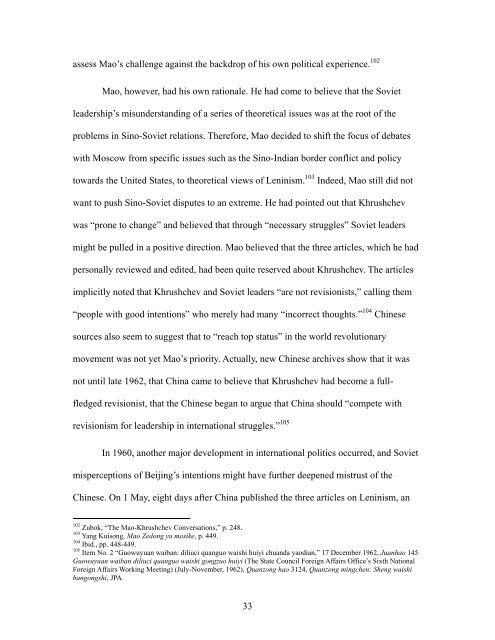The Quarrelling Brothers: New Chinese Archives and a ... - CiteSeerX
The Quarrelling Brothers: New Chinese Archives and a ... - CiteSeerX
The Quarrelling Brothers: New Chinese Archives and a ... - CiteSeerX
- No tags were found...
Create successful ePaper yourself
Turn your PDF publications into a flip-book with our unique Google optimized e-Paper software.
assess Mao’s challenge against the backdrop of his own political experience. 102Mao, however, had his own rationale. He had come to believe that the Sovietleadership’s misunderst<strong>and</strong>ing of a series of theoretical issues was at the root of theproblems in Sino-Soviet relations. <strong>The</strong>refore, Mao decided to shift the focus of debateswith Moscow from specific issues such as the Sino-Indian border conflict <strong>and</strong> policytowards the United States, to theoretical views of Leninism. 103 Indeed, Mao still did notwant to push Sino-Soviet disputes to an extreme. He had pointed out that Khrushchevwas “prone to change” <strong>and</strong> believed that through “necessary struggles” Soviet leadersmight be pulled in a positive direction. Mao believed that the three articles, which he hadpersonally reviewed <strong>and</strong> edited, had been quite reserved about Khrushchev. <strong>The</strong> articlesimplicitly noted that Khrushchev <strong>and</strong> Soviet leaders “are not revisionists,” calling them“people with good intentions” who merely had many “incorrect thoughts.” 104 <strong>Chinese</strong>sources also seem to suggest that to “reach top status” in the world revolutionarymovement was not yet Mao’s priority. Actually, new <strong>Chinese</strong> archives show that it wasnot until late 1962, that China came to believe that Khrushchev had become a fullfledgedrevisionist, that the <strong>Chinese</strong> began to argue that China should “compete withrevisionism for leadership in international struggles.” 105In 1960, another major development in international politics occurred, <strong>and</strong> Sovietmisperceptions of Beijing’s intentions might have further deepened mistrust of the<strong>Chinese</strong>. On 1 May, eight days after China published the three articles on Leninism, an102 Zubok, “<strong>The</strong> Mao-Khrushchev Conversations,” p. 248.103 Yang Kuisong, Mao Zedong yu mosike, p. 449.104 Ibid., pp. 448-449.105 Item No. 2 “Guowuyuan waiban: diliuci quanguo waishi huiyi chu<strong>and</strong>a yaodian,” 17 December 1962, Juanhao 145Guowuyuan waiban diliuci quanguo waishi gongzuo huiyi (<strong>The</strong> State Council Foreign Affairs Office’s Sixth NationalForeign Affairs Working Meeting) (July-November, 1962), Quanzong hao 3124, Quanzong mingchen: Sheng waishibangongshi, JPA.33
















